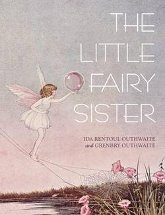The little fairy sister by Ida Rentoul Outhwaite and Grenbry Outhwaite

National Library of Australia, 2013 (A. & C. Black, London,
1929) ISBN 9780642277725
(Age: 7-adult) Warmly recommended. Picture book, Australian Fairy
Tales. Nostalgia. It is always astonishing to open a book
that has been reprinted from long ago, and see that font and be
transported back to your own childhood where books were few,
borrowed from the local library or given at Christmas.
In my grandmother's cabinet was this book, and I would take it out
and carefully read it as a child. The story has long been forgotten
but not that font.
In reprinting this book, from the Marcie Muir collection at the
National Library, a new generation will be introduced to these
stories first published in 1929. Marcie Muir, an avid collector and
bibliographer of Australian books for children, accumulated over
7000 books, including 86 editions of Norman Lindsay's The magic
pudding and this collection was acquired by the National Library
after her death in 2007. An introduction by Stephanie Owen Reader
relates a brief history of the Outhwaites, particularly Ida and her
place in the history of Australian children's literature.
The little fairy sister introduces us to a young girl, Bridget,
whose sister, Nancy, has died. She longs to see her again in the
Country of the Fairies where she resides. When Mother and Father are
going out for the afternoon, they leave Bridget sleeping in her
hammock under the tree. She hears Nancy's voice and the two go off
into the Country of the Fairies, until she wakes. While there she
meets many of her sister's companions, Lizard, Kookaburra, Merman
and Tree-man. This delicate, ethereal story and its accompanying
enchanting illustrations, will entice new readers of the genre,
easily outdoing many of the generic fairy stories finding their way
onto the market. That it was written so long ago and included
Australian animals is to be noted, as this was a time when all
things Australian were cherished, but this movement it seems gave
way to all things American as the latter half of the twentieth
century ensued.
Fran Knight